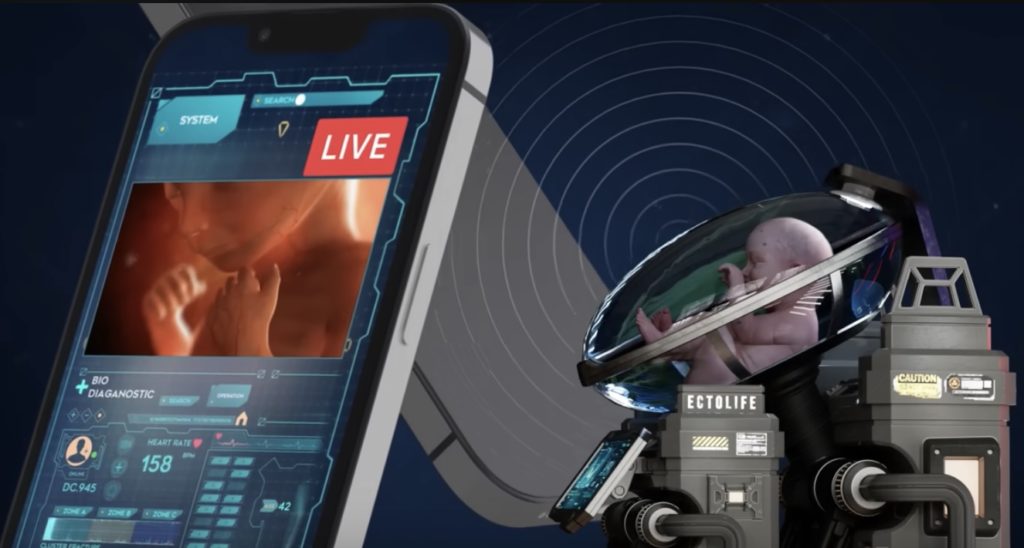It would be wrong to assume that an artificial womb facility for humans—which "reinvents evolution" through genetic engineering and artificial intelligence—might only exist in science fiction. In 2017, scientists successfully grew eight fetal lambs for 105 to 120 days inside a synthetic womb called a "biobag" with tubes supplying amniotic fluid. Then in 2021, scientists grew mouse embryos for up to eleven days, also inside artificial wombs. Combine these accomplishments with the Jan 2022 tweet by Elon Musk warning of the end of humanity, and it seems obvious that those driving The Great Reset might already have a transhumanism-pushing solution to the declining sperm counts and "jaw-dropping" birthrates (both helped along by the mRNA COVID jabs) that have been well covered by the big-pharma-funded mainstream news media. Welcome to the future where artificial womb facilities produce "genetically superior" human embryos.
The company behind the concept hoping to change evolution by genetically engineering human embryos in germ-free artificial womb facilities is called EctoLife. The process would begin with in-vitro fertilization (IVF), then the newly created embryos would be implanted in the artificial womb. The "highly efficient" wind and solar-powered birthing labs are the brainchild of Yemeni influencer Hashem Al-Ghaili, a graduate of Jacobs University Bremen with a master's degree in Molecular Biology. Al-Ghaili, who has undoubtedly conquered digital storytelling, shares his vision of EctoLife in the video below, noting that parents can "track [their] baby's health from the comfort of [their] zone."
A Dec. 9, 2022 press release shared by Science and Stuff broadcasted Al-Ghaili's vision, where he proclaimed he believes EctoLife could one day replace traditional birth. Heavily promoting the need for a "new form of birth," the press release says that the World Health Organization (WHO) currently estimates that globally, 15 percent of reproductive-aged couples are affected by infertility. Additionally, referencing data from the World Economic Forum (WEF)—which has unequivocally informed humanity that the 4th Industrial Revolution will merge man with machines—the press release adds that "over the last 70 years, fertility rates worldwide have decreased by a staggering 50%." The article cites reasons for this decline, which "include (among other things), women's increased education, increases in employment, the high cost of raising children, and a drop in global sperm count, adding that "twenty-three countries are already at risk, with Japan, Spain, Portugal, Thailand, and South Korea at the forefront of the crisis."
VIDEO: Klaus Schwab | "The Difference of This Fourth Industrial Revolution Is That It Changes YOU If You Take the Genetic Editing."
With science fiction becoming a reality, every growth pod would be formulated to mimic the exact environment inside a mother's uterus, with a single lab facility capable of growing 30,000 babies annually. Each pod would feature sensors to monitor a baby's vital signs and use a system controlled by artificial intelligence to customize nutrients "tailored to their needs." Two central bioreactors in the facility would maintain the baby. The first bioreactor would feed babies through an artificial umbilical cord, supplying nutrients, oxygen, and the amniotic fluid surrounding them. According to the press release, the fluid will be rich with "vital hormones, growth factors, and antibodies" designed to sustain a baby's growth and development. Presumably, these would all be genetically engineered synthetic creations. The second bioreactor would remove waste released by the artificial umbilical cord. The waste would then be treated with a layer of engineered enzymes and recycled back into usable nutrients, providing "steady and sustainable" nutrition to babies.
The press release points out that the assistive reproductive technology (ART) market, which includes IVF, is rapidly getting larger. In fact, it states that the market for IVF services is expected to grow to over $35 billion by 2030, while the market for IVF devices is expected to reach $10 billion by 2030. Surely realizing a profitable opportunity, the release declares, "given these market conditions, it seems that a concept like EctoLife is all but inevitable." EctoLife emphasizes:
"Our goal is to provide you with an intelligent offspring that truly reflects your smart choices.
EctoLife allows your baby to develop in an infection-free environment. The pods are made of materials that prevent germs from sticking to their surfaces. Every growth pod features sensors that can monitor your baby's vital signs, including heartbeat, temperature, blood pressure, breathing rate, and oxygen saturation. The artificial intelligence-based system also monitors the physical features of your baby and reports any genetic abnormalities.
And if you want your baby to stand out and have a brighter future, our elite package offers you the opportunity to genetically engineer the embryo before implanting it into the artificial womb."
Indeed, thanks to the CRISPR Cas-9 gene editing tool (which is firmly planted in future mRNA-based therapies), prospective parents would be able to edit any trait of their baby through a wide range of over 300 genes. By genetically engineering a set of genes, EctoLife's "elite package" would allow the customization of the baby's eye color, hair color, skin tone, physical strength, height, and level of intelligence. Likewise, Al-Ghaili remarked that gene editing would allow parents to fix any inherited genetic diseases that are part of their family history so "[their] baby and [their] offspring will live a healthy, comfortable life, free of genetic diseases."
According to the EctoLife press release, by using 360-degree cameras inside the artificial womb paired with a virtual reality headset, parents could "experience what their baby sees and hears" inside the manufactured setting. Of course, in EctoLife's synthetic environment, with all qualities of human nurturing removed, mothers would be unable to feel their baby's first kick and all the ones that follow. Nevertheless, the growth pods would be connected to an app where parents could monitor their baby from "anywhere in the world." And labor and delivery will be as simple as pushing a button.
 Screenshot / EctoLife / Virtual reality headset viewing baby in real time. Credit: Hashem Al-Ghaili
Screenshot / EctoLife / Virtual reality headset viewing baby in real time. Credit: Hashem Al-Ghaili
 Screenshot / EctoLife / App connected to baby inside artificial womb. Credit: Hashem Al-Ghaili
Screenshot / EctoLife / App connected to baby inside artificial womb. Credit: Hashem Al-Ghaili
 EctoLife growth pods are connected to an app that helps parents to monitor their baby from anywhere in the world. Credit: Hashem Al-Ghaili
EctoLife growth pods are connected to an app that helps parents to monitor their baby from anywhere in the world. Credit: Hashem Al-Ghaili
But wait, the idea of developing exceptional human life outside the womb doesn't stop with the breeding of premium babies. Besides the obvious ethical concerns, and no doubt putting "science on a collision course with the abortion debate" (and perhaps offering another justification for researchers to jump on board with artificial wombs), MIT Technology Review reports that human embryos created outside of the womb could be a research substitute for tissue derived from abortions and a possible tissue source for medical treatments. Recent developments in stem cell research may make this a reality.
On May 26, 2021, the International Society for Stem Cell Research (ISSCR), the international body representing stem-cell scientists, tossed out a 40-year-old 14-day limit on the length of time that scientists could grow human embryos in a lab. For context, embryonic stem cells result from IVF and are harvested by researchers during the IVF process. In turn, these cells can create almost any type of functional cell in the body. As research and technology in this arena move forward at a remarkable pace, the ISSCR removed the 14-day rule and now suggests that studies seeking to grow human embryos beyond a two-week mark should be considered on a case-by-case basis. As explained by Nature:
"The ISSCR made this change and others to its guidelines for biomedical research in response to rapid advances in the field, including the ability to create embryo-like structures from human stem cells. In addition to relaxing the '14-day rule', for instance, the group advises against editing genes in human embryos until the safety of genome editing is better established."
According to many scientists, the CRISPR-baby scandal in 2018 might have also helped propel human gene editing forwards. Indeed, it seems inevitable that the prospect of gene-edited babies born from an artificial womb presents not the question of if it will happen but instead highlights the swift pace at which such technology is moving forward to become a reality. Dr. Carlo Bulletti, Associate Professor at Yale University's Obstetrics, Gynecology, and Reproductive Science Department, believes that a fully functioning artificial womb could be realized within the next ten years. Meanwhile, Social Ethics and Policy Academic Elizabeth Chloe Romanis wrote in the BMJ's Journal of Medical Ethics in 2018—in one of several artificial womb studies funded by lockdown-promoting and vaccine-pushing Wellcome Trust—that additional refinement of the biobag, as well as scientific and safety validation, is essential before clinical use can be expected. With that in mind, Romanis added:
"The researchers, however, do imply there is enough reason to believe the technology might successfully be used on human subjects to justify experimental application on human beings in [the] future.
It seems probable that we are only several years away from testing on human subjects."
Without question, EctoLife creator Hashem Al-Ghaili has put great effort into his endeavors, which include his Sci-Fi film Simulation (where advanced aliens imprison humans), Sky Cruise Flying Hotel, the not-yet-released Sci-Fi feature film Orbital, and now EctoLife. All of these are purposefully connected to Artificial Intelligence (AI), which, if the global elite get their way, will soon be an integral part of daily life. Curiously, in a LinkedIn post (video below), Al-Ghaili recently shared that scientists from Google and Oxford claimed in August 2022 that AI may soon destroy humanity.


